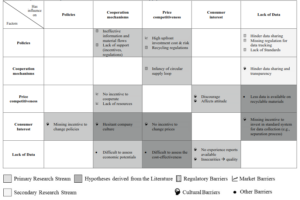2024

Anna-Kristin Behnert; Oliver Antons; Julia Arlinghaus
Exploring the Challenges of Circular Economy Adoption: A Supply Chain Perspective Journal Article
In: IFAC-PapersOnLine, vol. 58, no. 19, pp. 211-216, 2024, ISSN: 2405-8963, (18th IFAC Symposium on Information Control Problems in Manufacturing INCOM 2024).
Abstract | Links | BibTeX | Tags: Cause-And-Effect Relationships, Circular Economy, Circular Supply Chain, Supply Chain Management, Sustainability
@article{BEHNERT2024211,
title = {Exploring the Challenges of Circular Economy Adoption: A Supply Chain Perspective},
author = {Anna-Kristin Behnert and Oliver Antons and Julia Arlinghaus},
url = {https://www.sciencedirect.com/science/article/pii/S2405896324015829},
doi = {https://doi.org/10.1016/j.ifacol.2024.09.168},
issn = {2405-8963},
year = {2024},
date = {2024-01-01},
urldate = {2024-01-01},
journal = {IFAC-PapersOnLine},
volume = {58},
number = {19},
pages = {211-216},
abstract = {The prevailing linear economic structure and our complex global supply chains are reaching their tangible limits, as evidenced by the impact of current crises such as energy scarcity. A shift from a linear to a Circular Economy is necessary to meet the urgent environmental and economic challenges. This paper aims to address a significant gap in the literature by utilizing a structured literature review and the Supply Chain Operation Reference (SCOR) model. Rather than focusing on specific contexts or industries, this paper aims to examine the intercorrelation and interdependencies between the barriers from a supply chain perspective. Therefore, the diverse conceptual background of the Circular Economy and the complexity of its implementation due to the interconnectedness of barriers that span regulatory, cultural, market, and technological aspects are analyzed. The interdependence of barriers in the different supply chain stages is highlighted in a qualitative and explorative research approach. The key findings reveal that a successful supply chain management strategy that integrates Circular Economy principles along the whole supply chain is crucial for successfully transitioning from a linear to a Circular Economy. We identify necessary lines of future research to facilitate the successful transition and overcome the current barriers along the supply chain.},
note = {18th IFAC Symposium on Information Control Problems in Manufacturing INCOM 2024},
keywords = {Cause-And-Effect Relationships, Circular Economy, Circular Supply Chain, Supply Chain Management, Sustainability},
pubstate = {published},
tppubtype = {article}
}
The prevailing linear economic structure and our complex global supply chains are reaching their tangible limits, as evidenced by the impact of current crises such as energy scarcity. A shift from a linear to a Circular Economy is necessary to meet the urgent environmental and economic challenges. This paper aims to address a significant gap in the literature by utilizing a structured literature review and the Supply Chain Operation Reference (SCOR) model. Rather than focusing on specific contexts or industries, this paper aims to examine the intercorrelation and interdependencies between the barriers from a supply chain perspective. Therefore, the diverse conceptual background of the Circular Economy and the complexity of its implementation due to the interconnectedness of barriers that span regulatory, cultural, market, and technological aspects are analyzed. The interdependence of barriers in the different supply chain stages is highlighted in a qualitative and explorative research approach. The key findings reveal that a successful supply chain management strategy that integrates Circular Economy principles along the whole supply chain is crucial for successfully transitioning from a linear to a Circular Economy. We identify necessary lines of future research to facilitate the successful transition and overcome the current barriers along the supply chain.